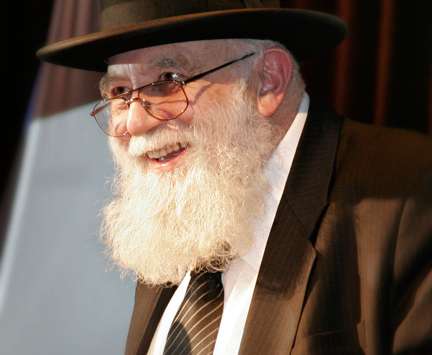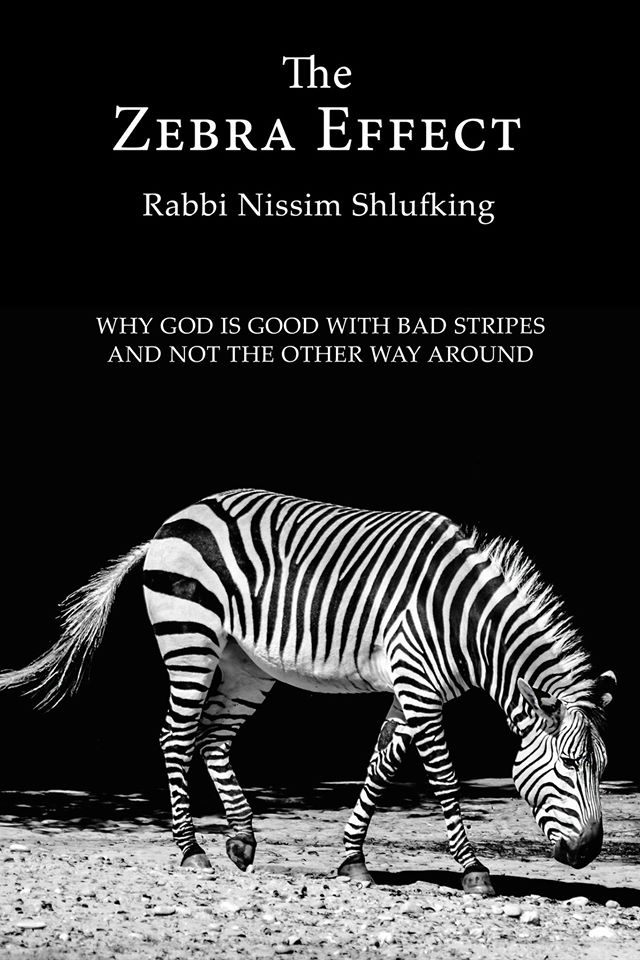One of my earliest memories of Rabbi Noach Weinberg, also known by the more anglicized name of Noah Weinberg, was encountering him in the street as a young child. I was intimidated, but he gave me the brightest smile and fished through his briefcase for a lollypop. (I can’t remember whether he found one or was apologetic for not having one.)
This memory is confusing because this is the same person who dragged two generations and thousands of people into the cult of Orthodox Judaism in general and into the specific brand of evangelical outreach that Aish Hatorah, the institute he founded, was famous for.
On a personal level, he stole my father from me, modeling parental absenteeism in the way he fathered his own 12 kids; my father followed suit, traveling for almost a third of every year and immersing himself in his work even when he was in the country.
Rabbi Noach Weinberg sacrificed the well-being of his family and followers for the sake of “saving the Jewish people,” and I do not doubt that his overall intentions were altruistic.
Ironically though, it was Rabbi Noach Weinberg who would often remind people that the road to hell was paved with good intentions, and, in many of his obsessive references to Hitler, he would point out that the dictator probably believed he was doing the right thing.
It is unfortunate that “Rav Noach” as his devotees referred to him, fell into the trap that Nietzsche warned of – whoever fights monsters should see to it that in the process he does not become a monster.
Blinded by His Smile
Rabbi Noach Weinberg was incredibly charismatic, and he utilized his power to its fullest potential: he inspired his followers to fulfill an idealized mission of saving souls while also fueling their feelings of guilt and inadequacy by reminding them that there was so much still to do.
Using graphic analogies that compared intermarriage (Jews marrying non-Jews) to the gas chambers, he compelled his followers to live in a perpetual state of emergency, frantically trying to convert unaffiliated Jews to the beauty of the religion while believing with starry-eyed conviction that their actions were heralding the arrival of the Messiah.
In his legendary rousing speeches, often delivered during the Jewish holidays (he was frequently absent on fundraising trips the rest of the year), Rabbi Noach Weinberg would paint flowery pictures of ideal utopias (“And the desert bloomed!”), while using strong language like “bloody” and “hell” to drive his point home.
On PurimPurim's Spiritual Theme: Genocide Purim is a popular Jewish ... More, Rabbi Weinberg would get extremely drunk and physically slap students who would come to visit him over things like not remembering some commandment that he particularly liked or a Jewish text or idea he believed should always be on the tip of one’s tongue (I personally witnessed this). The next moment he would break into a wide smile – of course he deeply loved you; he was just worried you weren’t meeting your potential.
Push and pull.
By Hook or Crook
To many of the most steadfast devotees he attracted in the late 70s and 80s, he represented a father figure, and they desperately craved his validation and approval.
Rabbi Noach would deliberately play with this desire, withholding approval or keeping his opinions cryptic. He would speak of “only needing 10 true leaders to change the world,” while claiming that he had only met one or two people who met his criteria for a “true leader” and refusing to reveal who those people were. This form of language and behavior sustained perpetual feelings of inadequacy and competition amongst his followers.
For Rabbi Noach Weinberg, the idealistic end justified many unethical means. Legends were told of the lengths to which he and his associates colluded to drag people into the walls of his institution for the purpose of engaging in debate about “meaning,” “truth,” and “Jewish wisdom.”
In one notable example, a person who was just looking for a bathroom was brought in to meet with Rabbi Weinberg, and only after 15 minutes of discussion was this “confusion” clarified. (the primary perpetrator of this incident was Meir Schuster, but Rabbi Weinberg was clearly complacent in the broader agenda, and the fact that this tale was often retold with amusement bordering on admiration, is telling)
An Idealized Judaism
Rabbi Noach Weinberg understood, correctly, that Orthodox Judaism’s dogmatic, outdated, and rigid worldviews and laws would not appeal to the average secular, unaffiliated Jew.
So he developed an extensive curriculum of classes and materials that redirected the focus, emphasizing the uniqueness of what it meant to be Jewish, including outsized claims about how much Jews had shaped society and “introduced morality to civilization.”
The obsessive focus on Jewish pride was justified as a means to a larger end of creating a utopia for all of humanity – if Jews just tapped into their roots, they’d then in turn solve the rest of the world’s problems. (There was continuous whitewashing and justification around the fact that most socially influential Jews were also secular or atheists)
Another recurring message was that of personal growth and self-actualization. Rabbi Noach claimed to provide keys for living a more meaningful life and navigating its many challenges, packaging these concepts in catchy classes and seminars with names like “The 5 Levels of Pleasure” and “The 48 Ways to Wisdom”.
In reality, much of the “beauty of Jewish life” that was portrayed to the people who walked through the doors of AishYeshiva Aish Hatorah, also known as Aish, is a cult educatio... More Hatorah’s Yeshiva in Jerusalem were idealized portrayals of reality, carefully curated to hide the truth that many of Aish’s teachers, leaders, and families struggled with.
After preaching about possessing secrets to a happy marriage for decades (and shitting on secular society for having so many “broken homes”), at least four different AishYeshiva Aish Hatorah, also known as Aish, is a cult educatio... More rabbis all got divorced within a few years of each other. The next generation did not fare much better, with another spate of divorces afflicting the children they married off (including myself).
I have heard from several sources, but have no proof, that Rabbi Weinberg himself was estranged from his wife and did not live with her, but that this fact was hushed up.
Rabbi Noach Weinberg’s wife, Rebbetzin Dinah Weinberg, was a strict and dogmatic principal of her own tiny women’s seminary located in the heart of the Ultra-Orthodox neighborhood in Jerusalem. Her rule was so extreme that her school never managed to maintain more than a handful of students at a time – it did manage to claim my mother as a victim though.
Behind the smiling faces and delicious food served by AishYeshiva Aish Hatorah, also known as Aish, is a cult educatio... More families to unaffiliated college students who were invited for weekend Shabbat meals, were severe mental health and personality disorders, violence, and repressed emotions, and parents who were more committed to an idealized mission than parenting their children.
The Morality Obsession
Noach Weinberg had an obsession with morality. He would speak of it constantly, and always in extremes. Humanity was the best, but they were also the worst. Jews used to be the best, a light unto the nations that shaped and created anything that is good and right in the world (contrast that with the opinion of a different person named Noach) but now they were at their worst.
Weinberg preached objective morality, where we could not possibly know what right or wrong was without external guidelines. He had a deep mistrust of human intentions and one’s inner compass, preferring to delegate the entire decision-making process to God, once he had proven to himself that one existed. (And how important must it have been to him that there be a God, if the alternative was no absolute right and wrong, no external sense of direction?) Suppressing one’s own intuition is a fundamental tenet of dogmatic beliefs, and it explains a lot of the subsequent behaviors expressed by him and his followers.
Morality was used for everything – to establish a need for God, to prove that there was a God, and to stoke the fears of a world without one. Ironically, this was used to justify a great many immoral things, both in the methods in which people were sold morality and in the ideas themselves. Weinberg’s morality was firmly consequentialist, allowing for many nefarious means to justify the goodness it promised at the end, as described earlier.
Then of course there were the many damaging ideas that rabbinical Judaism contained – ones which Weinberg believed were part of the complete package, and therefore were good for you even if they didn’t seem that way.
Genocide was a bad thing, of course, but if it was Amalek that was okay.
Murder was a bad thing, certainly, but if it was capital punishment for a variety of arbitrary sins, that was okay.
Basic human rights were our invention, but if you were a woman or a biblically condoned slave, well, that was part of God’s plan for you.
To this day, my father’s biggest issue with us non-religious children is our “immorality.”
We pose an existential threat to our own “potential” and are net-detractors from society for not keeping Shabbat, being non-monogamous, or being gay.
This, while he uses every means necessary to criticize “radical Islam,” such as invoking the backwardness of their laws and worldviews which are ironically very similar to his own, or pretending to care about gay rights even though his opinion on the subject is clear.
It’s the objectively moral result that matters, and he’ll fight you ’till the end over what that “objective truth” is, after which everything else falls neatly apart into place.
The armchair psychologist in me believes that Rabbi Noach Weinberg’s obsession with morality was his own flawed way of coping with his Holocaust trauma (he was 15 when the war ended, and he must have undoubtedly been impacted by it). It explains why he constantly referred to Hitler, drew comparisons to Nazis, and sought continuous inspiration by taking students and Rabbis to visit concentration camps.
To make sense of all that evil, Weinberg needed to reduce all of life into a black-and-white, good-and-evil paradigm, one where the Jews were ultimately good, ultimately winning, and whose oppression and downfalls only proved their uniqueness. Antisemitism was one of the foundational proofs he used to prove God (antisemitism is so unique + the Torah predicted there would be antisemitism = the Torah must be the work of God).
Impractical Leadership
Rabbi Noach Weinberg’s key strength was vision and charisma; beyond that, he proved to be terrible at organizational management and a poor judge of character. The daily runnings of his organization were plagued with politics and backstabbing, with him appointing incompetent people to key roles despite the protests of many of his advisors.
There were multiple incidents where people had their paychecks cut due to lack of funds, or were fired for political reasons, sometimes being re-hired shortly thereafter. Many people were treated like shit, their unwavering loyalty over decades of service thrown in their faces when they were no longer needed.
At a certain point, towards the end of his life, Rabbi Weinberg conducted an overhaul of the AishYeshiva Aish Hatorah, also known as Aish, is a cult educatio... More Hatorah Yeshiva, firing several long-time key leaders, including Rabbi Yitzchak Berkowitz (who is now, ironically, the new Rosh Yeshiva of AishYeshiva Aish Hatorah, also known as Aish, is a cult educatio... More Hatorah) and replaced them with the maverick Meir Pogrow, who promised to teach the new returnees to the faith more Torah in less time.
Rabbi Meir Pogrow was indeed brilliant, but he contained a Napoleon complex within his diminutive 5-foot frame, and it did not take long for anyone who spoke with him to see that he was a complete asshole. Rabbi Weinberg had prioritized Pogrow’s Torah knowledge over the character traits and personal refinement that he so often touted as the purpose of Judaism, all of which were glaringly absent in Pogrow.
After several years of running amok in the Yeshiva, Rabbi Pogrow was sent with a group of students to start a “Super Kollel” branch of AishYeshiva Aish Hatorah, also known as Aish, is a cult educatio... More Hatorah somewhere in Texas. While there, he was accused of abuse of power and grooming underage students. He has since left religion behind and was last seen somewhere in the Philippines.
The worst example of Rabbi Noach’s leadership decisions, which cast some doubt on his idealism versus personal motivations, was his choice to appoint his own son, Rabbi Hillel Weinberg, as his successor after his death.
Rabbi Hillel Weinberg was seen as clearly unfit to lead by everyone else in Aish’s leadership. Whereas Rabbi Weinberg had grown up in New York and commanded English to its fullest potential, his son had been raised in a sheltered neighborhood in Jerusalem and barely spoke English. Rabbi Weinberg had a fair knowledge of worldly ideas and cultural concepts, having studied in the US and apparently possessing a Master’s degree. His son had not been similarly educated.
The most embarrassing development of this decision was that even after Rabbi Hillel Weinberg’s inability to lead become clear once he assumed the role of Rosh Yeshiva, he still refused to step down for several years. It took multiple legal battles in Jewish courts, as well as being paid off financially, for him to finally move on. Once again, Rav Noach’s vision proved to be idealized and impractical, with little regard for reality.
A Legacy Worth Questioning
After his death, Rabbi Noah Weinberg’s status only grew. AishYeshiva Aish Hatorah, also known as Aish, is a cult educatio... More.com features annual articles about his greatness. His many shortcomings continue to be further whitewashed, as is common after people’s deaths.
Even mainstream Orthodox Judaism, which largely disagreed with or ignored him as a fringe movement and as lacking enough of their much-idealized intellectual Torah knowledge, has begun to embrace him after his death.
Rabbi Weinberg represents an idea that at most seemed good on paper, but has soundly failed the tests of reality. Many of his “successes” represent untold amounts of suffering, in the form of disenchanted people dragged into the clutches of Orthodox Judaism just long enough to become ensnared in it, through religious spouses and multiple children.
These “successes” were executed by his minions, who sacrificed their own identities and relationships for the sake of an idealized and impractical vision. There is a gaping, ugly gash that runs through two generations of AishYeshiva Aish Hatorah, also known as Aish, is a cult educatio... More alumni, while the remaining AishYeshiva Aish Hatorah, also known as Aish, is a cult educatio... More infrastructure sprinkles glitter over the destruction and frantically applies lipstick to the pig’s mouth.
Underlying much of AishYeshiva Aish Hatorah, also known as Aish, is a cult educatio... More Hatorah’s track record is a deep sense of hypocrisy.
Of not practicing what one preaches.
Of promising but not delivering.
Of selling universalism and implementing favoritism.
And I believe this incongruence stemmed from Noach Weinberg’s own character flaws, emotional imbalances, and lack of self-awareness.
The Means and The End
Did Rabbi Noach Weinberg have good intentions? I believe he did, for the most part. You can see kindness in his eyes and in his beaming smile.
Yet to rely on smiles and intentions to absolve him of the destruction caused by his “vision,” would commit what Nobel Prize-winning economist Milton Friedman would describe as “the mistake of judg[ing] policies and programs by their intentions rather than their results.”
It’s sad to acknowledge a person’s good side when you just want to hate them. It would be much simpler if life were divided simply down the middle as Noach Weinberg preached, with Good and Bad and Jews and Non-Jews all cleanly delineated. It’s sad to recognize just how far from reality an entire generation’s dreams and aspirations have landed – doing untold damage instead of the good they so desperately were trying for.
Would I have the courage to call Noach Weinberg a cult leader to his face? Maybe not. He really was large than life, and I, a mere mortal, do not have an almighty God to back me up.
But the fact that I only had the strength or clarity to call him out after he was dead should not diminish my right to do so.
So I just did.













